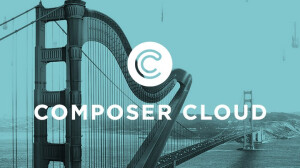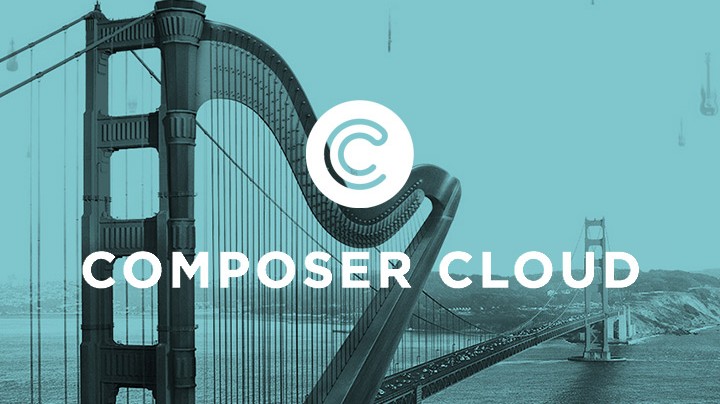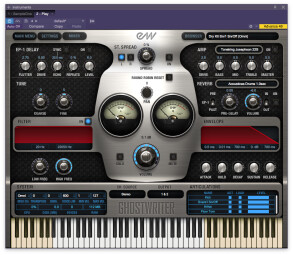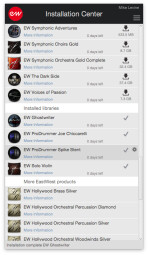Subscription-based plans are becoming more common for music software. While presumably a good thing for the developers, they’re not necessarily so great for users, who have to pay over and over for a license, and can lose access to the software if they let the subscription lapse, or if the developer goes belly up. That said, one subscription plan that I think might actually be a boon for musicians is EastWest’s Composer Cloud, which gives users access to a large selection of EastWest products without having to buy them.
EastWest has been a major player in the sound library and virtual instrument markets for many years. Its offerings lean fairly heavily towards the film-and-video scoring world, including a lot of orchestral instruments, but the company also has products for rock, pop, hip-hop and other types of music production.
What’s available
Fifty EastWest collections are available to Composer Cloud customers, which the company states includes a total of 9,000 virtual instruments (many of the collections feature multiple instruments). You can get collections such as the brand new ProDrummer Volumes 1 & 2, Quantum Leap Goliath, Steven Wilson’s Ghostwriter, Quantum Leap Goliath, The Dark Side, Ministry of Rock 1 and 2, Fab Four, Storm Drum 1 , 2 and 3, and Spaces Reverb (which will become available in late June).
Also available are the Gold versions of Hollywood Strings, Brass, Woodwinds, and Percussion. Quantum Leap collections such as Silk, Ra, Gypsy, Pianos, Solo Violin, and Voices of Passion are also available, as well as Symphonic Orchestra and Symphonic Choirs. You get access to all the products in the 25th Anniversary Collection, which contains 30 of the legacy EW collections including Twisted Textures, BT Breakz, Percussive Adventures 1 and Ultimate Strings, to name a few.
Overall, Composer Cloud offers a huge variety of sampled instrument sounds and textures.
How it works
Composer Cloud is available in two basic flavors:
“7 Collections” includes your choice of seven of the Composer Cloud collections, and you get an additional collection every three months, what EastWest calls a “loyalty bonus.” If you commit to an annual plan (you can pay monthly but must commit to a year), you’re charged $29.99 per month. If you want to join on a month-to-month basis with no commitment, it’s $44.99 per month.
The other option, “All Collections, ” gives you access to all of EastWest’s Composer Cloud collections. The annual plan with monthly payments is $49.99 per month. Month-to-month is $74.99 per month.
A special offer is also available for those who already own EastWest products, who, for the first year of their membership can get the All Collections annual plan for $29.99 per month and the All Collections month-to-month plan for $44.99 per month.
If you go for the 7 Collections annual plan, you’re locked into those seven collections for the year plus the bonus collections. If you don’t want to be limited to those, you can opt for the month-to-month plan. By paying the extra $15 per month, you’re free to switch collections every month, if you want.
Installation and use
Installing the EW collections is pretty easy. You create an account, download the free EW Play application, and you’re offered a choice to authorize either an iLok or a machine license on a specific computer. Then you can start downloading collections.
If you’re not familiar with EastWest plug-ins, they’re accessed from within EW Play, which can be opened as a standalone application or a plug-in. It’s multitimbral, and can load multiple EW collections in each instance you open, so you have a lot of flexibility.
Obviously, I can’t do a review of all the instruments here, but suffice it to say that on every EW instrument I downloaded for this review, the sound quality was superb. What’s more, each one has its own custom GUI that shows up inside the EW Play application when that instrument is selected, it’s not a one-size-fits-all interface.
Go for the cloud?
I’m not a huge fan of subscriptions for music software, although they seem to be the wave of the future. Developers offer perks to try to lure subscribers, but you may end up paying more in the long run in many cases. But Composer Cloud is an exception as far as I’m concerned. Unlike a DAW subscription, where you’re subscribing to the same DAW software you would have bought previously, Composer Cloud makes it possible for you to use a lot more of its products for the money, than if you purchase. For about $360 a year, if you do the 7 Collection plan, you’re getting access to seven products, many of which cost about $300 apiece for the download version (the legacy collections are less expensive). So, for less than the cost of purchasing one collection, you’re getting access to seven, plus three bonus collections (and a fourth at the end of your first year, if you renew), including some exclusive to subscribers, for a year.
If you join, you will have to deal with the software longevity issues mentioned earlier, so if you’re archiving a project with Composer Cloud instruments on it, I’d highly recommend printing stems for everything, in case you cancel your subscription or —if you have the 7 Collection —change to different instruments. Even with those caveats, I could see Composer Cloud saving me a lot of money compared to purchasing individual collections (or individual instruments from other developers) if I was doing a lot of music production or scoring work.
For someone who has a huge project coming up and knows they’ll need a lot of sampled virtual instruments for it, it might make economic sense to pay the $74.99 per month for a few months for the All Collection subscription, in order to have access to all the collections while the project is still going.
The bottom line is that EastWest hasn’t stopped selling its instruments the way it always has, so you’re not being forced to switch to a subscription, it’s only an option. What Composer Cloud does is provide you with a different way to get into EastWest’s lavish world of instruments and sounds, one that lets you affordably access much more content than you could via purchase.





